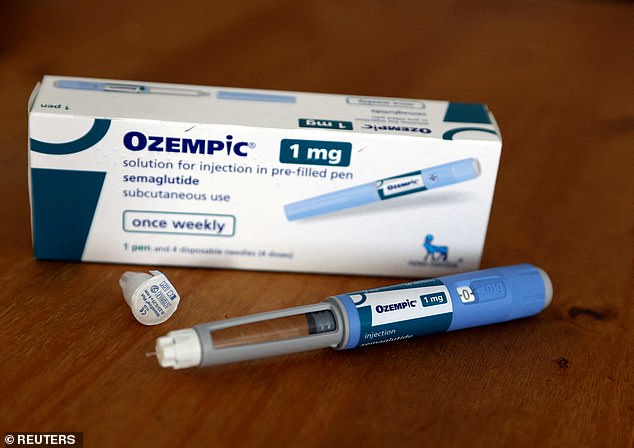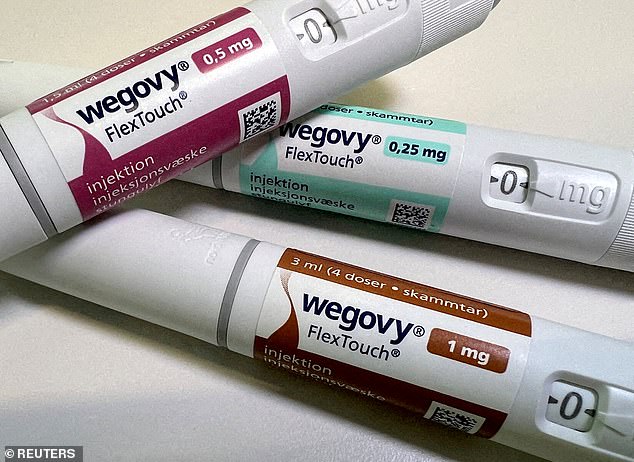A protein shake has been developed to combat the serious loss of muscle mass associated with popular slimming drugs.
Ozempic and Wegovy (the brand names of semaglutide) were first created to treat diabetes, but have proven very effective in combating obesity, with patients receiving the highest doses of weekly injections losing up to a fifth of their body weight.
But studies suggest that about a quarter of weight loss is actually due to muscle, and experts warn that this could be dangerous, especially for older people, as it can increase the risk of falls.
Now medical firm Abbott has launched a line of high-protein, low-fat shakes in the US that are designed to maintain muscle mass among people taking weight-loss medications, and which experts hope will soon be available. available in the UK.
According to Abbott, its Protality drinks, which cost around £3 each, will be crucial for semaglutide patients, while other companies have also launched other products to combat muscle loss.

Weight loss medications, including Ozempic, while effective in combating obesity, also have muscle loss side effects.
Last year, Weight Watchers launched an app that offers nutritional advice to people taking semaglutide; Now the company also organizes access to private doctors who can prescribe it. Some companies are even developing medications to take alongside injections that can counteract muscle loss.
Professor Alex Miras, consultant endocrinologist and professor at Imperial College London, says: “Every weight loss technique leads to some muscle reduction but, until now, we haven’t had treatments as powerful as semaglutide.”
“We must find ways to prevent people from losing muscle mass, which can have dangerous consequences.”
Semaglutide is part of a class of medications known as glucagon-like peptide-1 (GLP-1) receptor agonists, the first of which was developed nearly two decades ago to treat type 2 diabetes.
These medications mimic the hormone GLP-1 in the intestine that helps with the release of insulin, which regulates blood sugar levels. But scientists also found that they suppressed appetite, leading to weight loss.
Last year, Prime Minister Rishi Sunak praised the drug and announced a pilot scheme in England to allow GPs to offer the weekly jab to obese patients.
However, experts are concerned about the amount of muscle mass patients appear to lose.
In a recent US study, participants lost, on average, 15 pounds (7 kg) of muscle and 23 pounds (10 kg) of fat during a 68-week trial. Trials of another GLP-1 drug, tirzepatide, found that patients lost about a tenth of their muscle mass.
“Weight loss occurs when the body breaks down fat to produce energy,” says Professor Miras. “During the process, the body will break down some muscles and even bones in its attempt to create energy.”
Professor Miras adds that excessive loss of muscle mass can have negative health effects, especially in older people. “Losing a lot of muscle can be detrimental to cardiovascular health because it makes it difficult to exercise,” he says. ‘But having less muscle at an older age makes you more vulnerable to falls. This can lead to serious broken bones.’
In December, reality TV star Sharon Osbourne described semaglutide as “very dangerous” after losing 42 pounds (19 kg) in less than a year. The 71-year-old, who weighed 64 kg (142 lb) when she began taking the treatment, said she “needed to gain the weight back.”
US firm Abbott believes that increasing patients’ protein intake could help combat worrying loss of muscle mass.
Studies show that a high-protein diet can help increase muscle mass, and according to Abbott, patients need to eat 50 percent more during a weight loss regimen to maintain a healthy body.


Wegovy weight loss medication. High-protein, low-fat shakes have been developed to compensate for muscle loss
Last month, the company launched its protein shake in the US, which contains 30 grams of protein, about half the daily amount recommended by the NHS.
But experts say the shake’s effectiveness will depend on the patient’s overall diet.
“People taking these medications eat so little that it is very difficult to give them the recommended amount of protein,” says Professor Miras. “If you barely eat, even drinking three protein shakes a day won’t supplement all the other nutrients you need, like carbohydrates.”
There are other options available for patients anxious about losing muscle mass while taking a GLP-1 drug. The Weight Watchers app tells you about your plans to make sure you maintain muscle as you lose weight. It also encourages users to exercise, which studies show is another important factor in preventing muscle loss.
Later this year, US company Regeneron will begin a clinical trial combining semaglutide with an antibody drug that blocks receptors that regulate muscle growth, theoretically preventing the body from breaking down muscle during weight loss.
Another American company, Biohaven, wants to use a drug designed to treat spinal muscular atrophy (a muscle wasting disease that affects children) to combat muscle contraction in GLP-1 patients.
“This will become an important field of medicine in the coming years,” says Professor Miras. “More and more patients will receive GLP-1 medications, so we need solutions to side effects, whether dietary supplements or new medications.”
